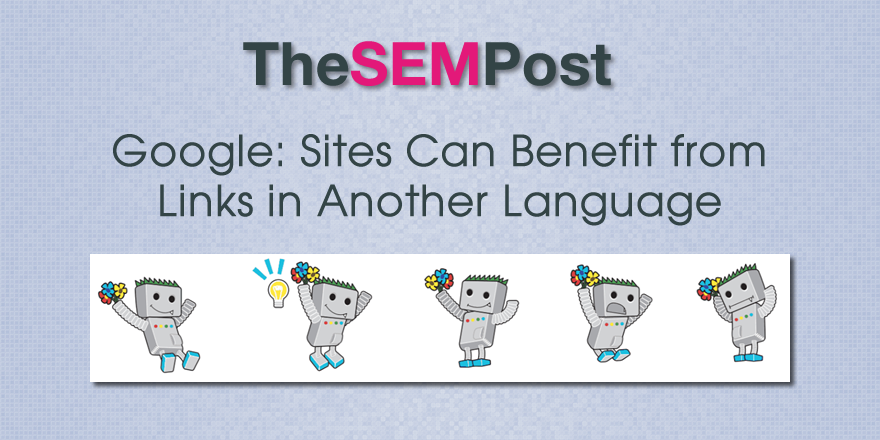 Have you ever wondered how Google reacts to links that come from a different language website than the one your site is in? After all, some of these links can be perfectly targeted and coming from a site about the same topic, but just happen to be in two different languages.
Have you ever wondered how Google reacts to links that come from a different language website than the one your site is in? After all, some of these links can be perfectly targeted and coming from a site about the same topic, but just happen to be in two different languages.
Can websites benefit from these types of links? Or should they be seen as a negative signal?
The question was brought up in today’s Google Webmaster Hangout with John Mueller: On a .com domain with English and German content, will the German content benefit from English links and vice versa?
John Mueller responded:
Yes, of course. If this is one website and you have different kinds of content and some kinds of links, then that’s something where generally speaking where the website will grow in value over time as you gain links, as you gain popularity, those kinds of things.
The main thing I’d watch out for there is really making sure you put these German and English content on separate URLs so you don’t have one URL with both German and English maybe side by side, but really separate URLs for each language.
Then he was asked for clarification specifically about a website in one language getting links in another language.
I don’t see a problem with that. I think that’s perfectly fine, that’s not something you’d need to artificially channel to an English version of the page or anything like that. That’s perfectly fine. That kind of situation happens all the time.
You also have that between different versions of your own website, so if you have an English version of the content and a Romanian version you’ll probably have a link back and forth saying this is the English version and this is the Romanian version, it’s perfectly fine.
Then he was asked if those links would have a lesser value.
No, I think we treat that just the same. The main difference I guess there is that the anchor text might be different. If we see a lot of anchor text going to one page with a specific text, and if that text is the wrong language then that might make it hard for us to figure out which page should we rank for this English query. Should we rank this Romanian page or should be rank the English page that kind of confirms it on the page?
This is interesting, because I do know that some people who do link disavowing will automatically disavow any link that comes from a site that is not in the same language as the destination site, without exception. But if Google does not penalize these links just because they are in a different language, this means that some of these sites are disavowing perfectly legitimate links, rather than judging them on their own merit.
That said, just because it is in another language doesn’t mean it is a good quality link either. If you are disavowing, you will still need to judge a site and it’s link based on the quality of the site, which is definitely harder to do when the site is in a different language. Google Translate will be a friend, but you can also do other quality checks on a site which can help you evaluate… even based on the initial reaction when you first look at a site.
It also means you can look at building links from websites in languages other than the one your site is in, which will definitely open the door to many more link opportunities.
Here is the video:
Sites and pages with inbound links in other languages can still benefit the site.
Jennifer Slegg
Latest posts by Jennifer Slegg (see all)
- 2022 Update for Google Quality Rater Guidelines – Big YMYL Updates - August 1, 2022
- Google Quality Rater Guidelines: The Low Quality 2021 Update - October 19, 2021
- Rethinking Affiliate Sites With Google’s Product Review Update - April 23, 2021
- New Google Quality Rater Guidelines, Update Adds Emphasis on Needs Met - October 16, 2020
- Google Updates Experiment Statistics for Quality Raters - October 6, 2020
[…] Google: Sites Can Benefit From Links in Other Languages, The SEM Post […]